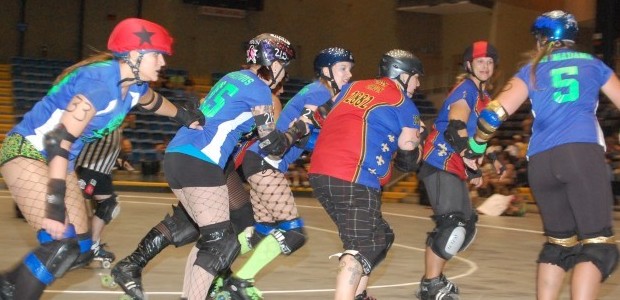
Art After Dark returns to Houma
September 5, 2012
Chartering a Comeback
September 5, 2012The Cajun Rollergirls are intense.
From hulking pads and scuffed helmets that foreshadow tomorrow’s swollen muscle to the punishing hip checks the girls inflict on opponents in a blowout’s last moments; from the sketch of blood beneath Jack E Rip Her’s eye to the thumb-and-finger handgun Delirium Trigger brandishes before she jams; from fishnet stockings and boy shorts to “Pervert” stamped on Alpha Bitch’s rump, the Houma-Thibodaux roller derby team revels in the sport’s alternative culture.
And they’re getting to be quite good at it.
Delirium Trigger is CRG’s star. Named Brittany Dominique, she is the anchor of pre-game introductions and the initial jammer (the most-glorified position) to take the track. A painted domino mask surrounds her eyes with deep red, and black paint streaks down her cheek. As she pumps through her warm-up lap, she holds onto toy guns and, while shouting, high-fives her opponents with ferocity.
“It’s not a persona, it’s not an ego; it’s just me,” Trigger, 23, says. “I’m not afraid to walk out of the house and go to Walmart like this after practice. I’m not afraid to just be my real self and be wild and crazy.”
Dominique says she was emotionally fragile when she joined the team two and a half years ago, the result of a relationship that sapped her self-esteem. Juxtaposed against what the svelte skater shows on the track, the gulf between then and now is unfathomable to an outsider, but No. 21:13 on the CRG roster insists her transformation was sparked by the sport and nurtured by welcoming teammates.
“My self-esteem was totally stolen,” Trigger says. “My ability to think I was good at anything just shot out the door. I started roller derby. I started to feel comfortable around these girls. They didn’t have to like me for any reason, they didn’t have to be nice to me for any reason. But they all gave me the time of day and helped train me.”
On the track, Trigger’s inexorable jams adhere to a visual formula. She laps Northshore’s Lethal Ladies with ease, reeling in the pack, vanishing for a moment and then emerging in front. It happens quickly, then the process repeats as she tracks down the pack of eight just to slide through and pop out ahead of them again.
She scores 138 points and records 24 grand slams in CRG’s 262-45 victory. (With apologies to baseball, a grand slam occurs each time a jammer laps all five opponents). To record 24 grand slams in eight jams is akin to a quarterback completing 14 of 10 passes for 17 touchdowns.
Although her conquests against the Lethal Ladies stole the show, Trigger isn’t the only capable jammer on her team. Jennifer “Jack E Rip Her” Glasser, in her first CRG season after transferring from Illinois, and Hester “Psycho Beast” Haddox, the CRG president, round out the top-three Rollergirls’ jammers.
“I’m more of, I’ll get down and take the hit,” Jack E Rip Her says. “Trigger uses more footwork. She jukes, she jukes, she jukes through the pack. … She’s the juker and I’m the bulldozer.”
Roller derby competitors disdain the perception that the sport is closer to Vince McMahon-professional wrestling or mixed martial arts than hockey on the athletics spectrum.
The reason outsiders perceive the sport this way is likely because earlier iterations devolved into a product that was staged, exaggerated and heavy-handed.
The concept started with 3,000-mile transcontinental races staged on an oval banked track. Twenty-five two-person teams skated 11 and a half hours each day, and at least one skater from each team had to be on the track during race hours.
Contact was eventually added to the sport, distances were pared down, the two-team, five-skater model became the predominant form and promoters began televising the sport.
Jerry Seltzer, whose father started the transcontinental skating races, oversaw the Roller Derby league when an interleague game with the National Skating Derby eclipsed 50,000 fans at an outdoor event in Chicago in 1972, according to newspaper accounts.
But Seltzer decided to shut down the league. Several spin-offs, all with various levels of legitimacy, tried to fill the vacancy, but none were able to sustain long-term success.
A television series called Roller Games, which debuted in 1989, is a fine example of the sport’s theatrics. The series featured a figure-eight track that included obstacles such as the Wall of Death, the Jet Jump and, one time only to settle a tie, a pit of alligators.
“I’m scared to death to see what happens when one of these teams’ specialty players – the gator skaters – falls into the pit. It could be absolutely devastating,” Roller Games announcer David Sims told a television audience.
Not long after, roller derby faded into obscurity. Roller Jam, another television-focused attempt, ran for two years on Spike TV at the turn of the century, but it didn’t gain traction.
A group from Dallas is credited with resuscitating the sport about a decade ago. Now, nearly 1,300 roller derby leagues exist worldwide, according to www.derbyroster.com. And flat track roller derby – the version CRG plays – is a rollersport, one of eight sport categories being considered for inclusion in the 2020 Olympics (Team USA won the 2011 Roller Derby World Cup by defeating Canada 336-33 in the final.)
An final list is expected to be announced late next year at an International Olympic Committee session. Baseball, softball, wakeboard, squash, sport climbing, karate and wushu are also being considered for the final 2020 slot. Surfing, dancing, bowling and netball have already been eliminated from consideration.
“I just wish more people would know what roller derby was and that we’re not out there punching each other in the face,” Glasser says.
It’s not violence, but it is punishing. Months after missing games with a separated shoulder and rehabbing an injured knee, Pyscho Beast plays through lower-back pain. Alpha Bitch broke her ankle in a practice last month. And the first lesson taught at the twice-annual boot camps for prospective skaters is learning to fall.
“I tell girls you have pads on your knees, elbows and wrists for a reason. Use them,” Psycho Beast says.
Safety is emphasized at every turn, yet body checking continues deep into a blowout game. Ahead by more than 200 points, the Rollergirls refuse to shy away from the Lethal Ladies prior to the final whistle. It’s not reckless, but it is relentless.
“The other girls will tell you they can respect that because they feel the same way,” Psycho Beast says. “It’s reciprocal. You respect the athletes on the track and you actually appreciate them not going easy on you. … Those teams weren’t cutting us a break at the end (last season). We appreciate that because we learned something all the way up to the end of the game.”
They ain’t your older sibling’s Rollergirls.
Four years after the team’s first scrimmage, CRG have grasped competitive relevance.
The Rollergirls, one of 30 teams across seven states with Derby South eligibility, are 4-2 (4-1 in Derby South competition) through August. That record is one win shy of the previous two years combined. (CRG went 1-7 in their inaugural season in 2010 and followed that with a 4-8 record last year.)
“Our coaching makes the difference,” Psycho Beast says. “Last year our coach concentrated mainly on endurance because that’s something we didn’t have. Our coach this year, he goes by Dutch (Ed Serrano), he’s all about strategy. … We’ve learned about how to apply the strategy, but more than anything, our communication and teamwork has gotten better.”
With its strong start the team is in the running to qualify for Derby South’s 10-team invitational tournament in Alabama. In August, before the win over Lethal Ladies was factored in, the squad was ranked 13th out of 30 Derby South teams.
Derby South, which covers seven states, aims to publish objective rankings. In doing so, the organization publishes anticipated scoring ratios that determine fluctuation. A team that beats the prediction scores points, and a team that loses to the prediction loses points.
The Rollergirls’ win over Lethal Ladies was a 5.8-to-1 ratio, which is twice the 2.9-to-1 ratio Derby South projected. The commanding win should help the team’s tournament chances, but the squad must defeat tough competition in the last month to make the cut.
CRG has bouts against No. 24 CenLa Derby Dames (Sept. 15, home) and No. 5 Crescent Wenches (Sept. 22, away) looming this month. In 2011, the Rollergirls defeated the Derby Dames (125-73) but lost twice to the Wenches (165-62 and 204-70).
“At the beginning of the season, that was our ultimate goal,” Psycho Beast says. “We had been at the bottom of the learning curve for so long that our goal was we just want to make it to the tournament. It would be unbelievable and so awesome to achieve that in one year.”
The non-profit, skater-run organization is on pace to become an official Women’s Flat Track Derby Association member next year. Prior to becoming a member of the international association, applicant leagues must complete requirements in the WFTDA apprentice league, which CRG has been a part of since 2009.
WFTDA is an international flat-track, quad-wheel roller derby governing authority. It sanctions matches between 156 full-member leagues, such as 2011-champion Gotham Girls Roller Derby of New York City and the Big Easy Rollergirls of New Orleans.
Each of the four WFTDA regions host playoffs, which begin with the top-40 teams and culminate with the championship match.
“WFTDA teams are all over the world,” Psycho Beast, the two-year CRG president, says. “It’s like having a basketball team and trying to make it in the NBA, trying to make it a professional team versus a recreational team.”
When the day comes, it will mark a significant accomplishment for the Rollergirls. The squad began to form in March of 2008, installed its first officers the next year and played its first competitive season in 2010.
The league is solely comprised of volunteers of both sexes: referees, graphic designers, photographers, scorekeepers, skaters and many other tasks – all unpaid, all after a regular workday.
Anyone interested in joining the CRG team, whether as a player or a volunteer, is urged to contact MediKILL at CRGrecruitment@gmail.com.
The Northshore Lethal Ladies’ jammer (with the star helmet cover) seeks to navigate and pass the Rollergirl blockers during an August bout in Thibodaux. The Rollergirls won the match 262-45 and improved to 4-2 (4-1 in Derby South competition) this season.











